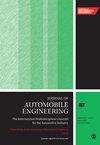On-board model predictive control for autonomous lane keeping with fuzzy preview distance: Design and experiment
IF 1.5
4区 工程技术
Q3 ENGINEERING, MECHANICAL
Proceedings of the Institution of Mechanical Engineers Part D-Journal of Automobile Engineering
Pub Date : 2024-05-18
DOI:10.1177/09544070241245485
引用次数: 0
Abstract
This paper concerns with the development of computationally efficient lane keeping control method for the autonomous vehicles. To obtain autonomous lane keeping, model predictive control (MPC) scheme was intensively investigated in the previous studies owing to its inherent advantage of dealing with constrained multivariable systems. However, the tradeoff problem between the good tracking performance and the low computational complexity is inevitably raised in developing of MPC-based lane keeping technology. To alleviate the conflict between performance and cost, an on-board MPC with fuzzy preview distance is designed in this study. A linear system dynamics model is used in the MPC design to reduce the computational cost, and a fuzzy logic algorithm is developed to select an appropriate preview distance for enhancing the MPC performance. Further, hardware-in-the-loop test is adopted to explore the effectiveness and efficiency of the proposed control method. In comparison to the proportional-integral controller, the experimental results show that the MPC is more sensitive to the selective value of fixed preview distance. Since the significant impact of preview distance selection on the MPC-based lane keeping performance, the fuzzy logic algorithm is of the essence in terms of selecting the appropriate preview distance for MPC enhancement under different vehicle speed and road curvature. Eventually, experimental results validate that the proposed fuzzy preview distance algorithm can effectively improve the MPC-based lane keeping performance for autonomous vehicles subject to limited computational resource.带模糊预览距离的自主车道保持车载模型预测控制:设计与实验
本文关注为自动驾驶车辆开发计算高效的车道保持控制方法。为了实现自主车道保持,模型预测控制(MPC)方案因其在处理受限多变量系统方面的固有优势,在以往的研究中得到了深入探讨。然而,在开发基于 MPC 的车道保持技术时,不可避免地会遇到良好跟踪性能与低计算复杂度之间的权衡问题。为了缓解性能与成本之间的矛盾,本研究设计了一种带有模糊预览距离的车载 MPC。在 MPC 设计中使用了线性系统动力学模型来降低计算成本,并开发了一种模糊逻辑算法来选择合适的预览距离,以提高 MPC 性能。此外,还采用了硬件在环测试来探讨所提出的控制方法的有效性和效率。与比例积分控制器相比,实验结果表明 MPC 对固定预览距离的选择值更为敏感。由于预览距离的选择对基于 MPC 的车道保持性能有重大影响,因此模糊逻辑算法在不同车速和路面曲率下选择合适的预览距离来增强 MPC 的性能至关重要。最终,实验结果验证了所提出的模糊预览距离算法能够在有限的计算资源条件下有效提高自动驾驶车辆基于 MPC 的车道保持性能。
本文章由计算机程序翻译,如有差异,请以英文原文为准。
求助全文
约1分钟内获得全文
求助全文
来源期刊

CiteScore
4.40
自引率
17.60%
发文量
263
审稿时长
3.5 months
期刊介绍:
The Journal of Automobile Engineering is an established, high quality multi-disciplinary journal which publishes the very best peer-reviewed science and engineering in the field.
 求助内容:
求助内容: 应助结果提醒方式:
应助结果提醒方式:


